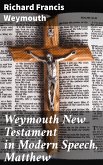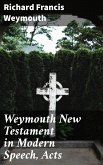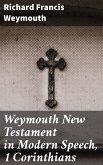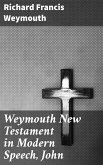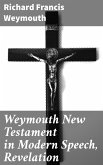Richard Francis Weymouth's "Weymouth New Testament in Modern Speech, Matthew" is a groundbreaking translation of the Gospel of Matthew that seeks to render the text in accessible, contemporary language without sacrificing its spiritual depth and theological significance. Weymouth's literary style is characterized by clarity and simplicity, allowing readers from diverse backgrounds to engage with the textual nuances more readily. Positioned within the early 20th century movement towards modern, relatable biblical translations, Weymouth's work emerges as a compelling response to the challenge of making ancient scriptures intelligible to a contemporary audience, employing a dynamic equivalence approach that prioritizes meaning over rigid literalism. Richard Francis Weymouth was a noted British scholar, philologist, and a devoted Christian who dedicated much of his life to biblical studies and translations. His deep understanding of both the original Greek texts and the linguistic needs of modern readers stemmed from his passionate advocacy for Biblical literacy. This impetus was fueled by a desire to bridge the gap between scholarly rigor and lay understanding, making the teachings of Christianity accessible to the broader public. For anyone seeking a deeper comprehension of the Gospel message through a modern lens, Weymouth's translation is invaluable. It invites readers to experience the transformative teachings of Matthew in a fresh and engaging manner. Whether you are a lifelong student of the Scriptures or a curious newcomer, this work provides a thoughtful and enriching journey through one of Christianity's foundational texts.
Dieser Download kann aus rechtlichen Gründen nur mit Rechnungsadresse in A, B, BG, CY, CZ, D, DK, EW, E, FIN, F, GR, H, IRL, I, LT, L, LR, M, NL, PL, P, R, S, SLO, SK ausgeliefert werden.



